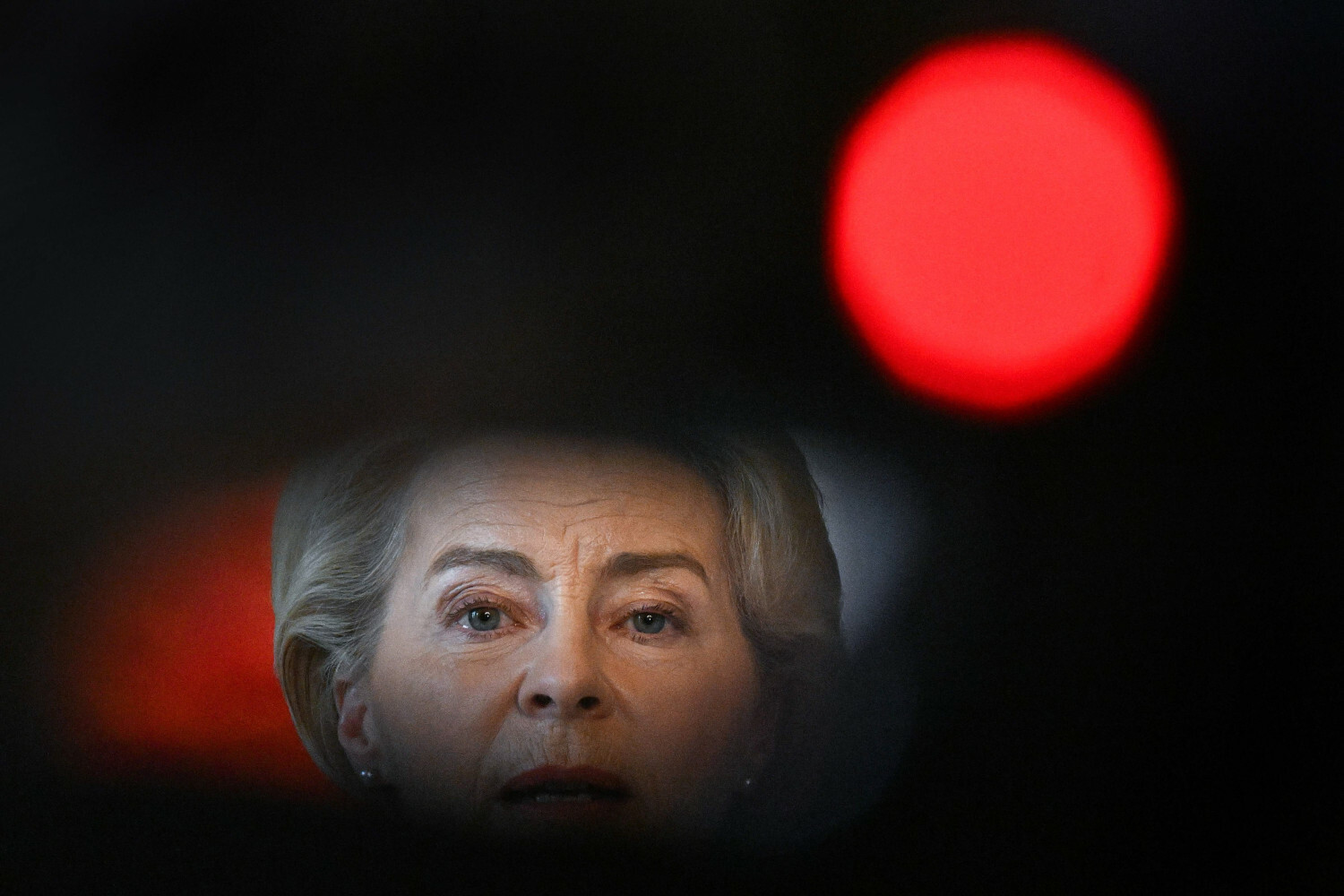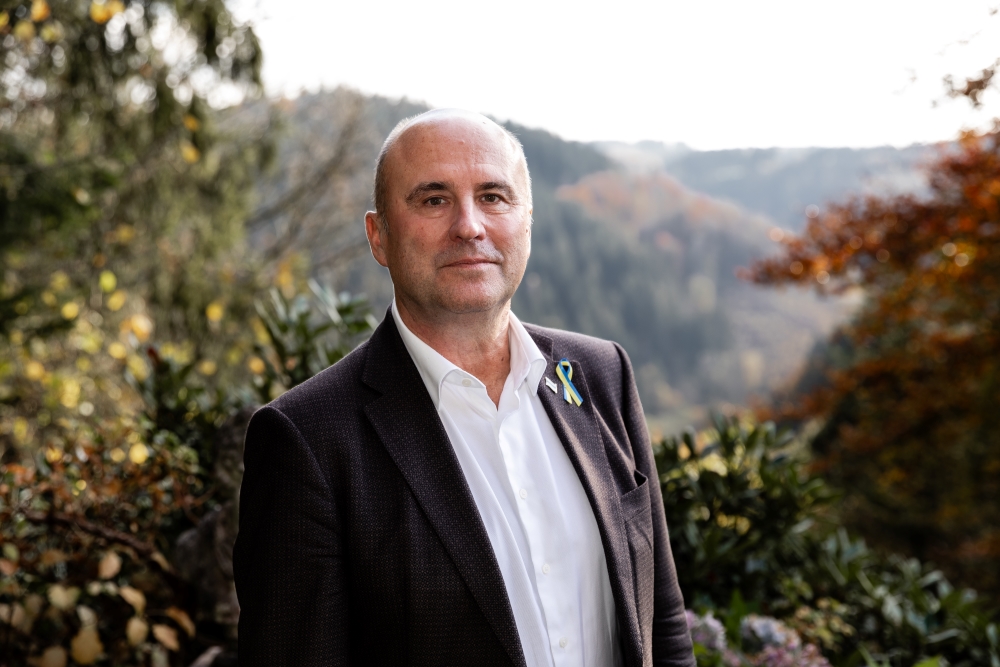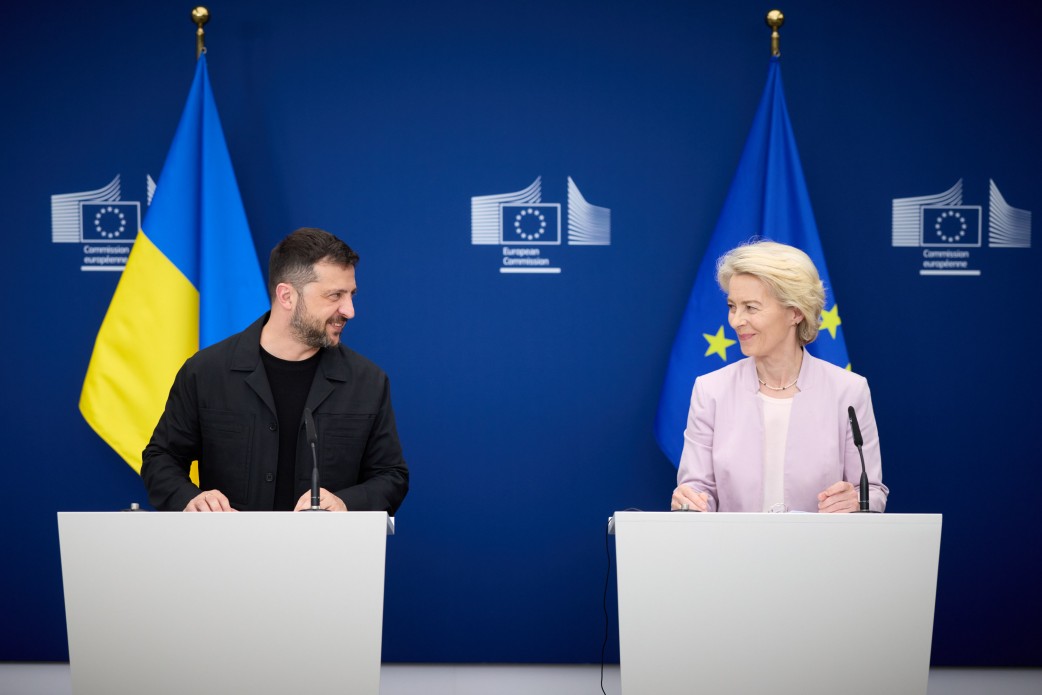Support Sestry
Even a small contribution to real journalism helps strengthen democracy. Join us, and together we will tell the world the inspiring stories of people fighting for freedom!
Following the announcements about the next year’s support reduction, Germany sent additional weaponry to Ukraine, among them are new Anti-aircraft weapons, UAVs, rifles and ammunition. But the amount of funds Germany will dedicate to Kyiv’s defence needs in 2025 remains unknown until Autumn.
What is the current mood within the government and the Bundestag? Will the support change, and could the successful raid in Kursk have an impact? Furthermore, how might the latest findings from the investigation into the Nord Stream pipeline explosions affect relations with Ukraine? These and other questions were addressed in an exclusive interview with Sestry by Roderich Kiesewetter, a member of the largest opposition faction, the CDU/CSU, in the German parliament.
Aid to Ukraine vs «Nord Stream»
Maryna Stepanenko: The German publication Frankfurter Allgemeine Zeitung (FAS) reports that Germany will limit its aid to Ukraine in the near future. Our Ministry of Foreign Affairs has already called this information manipulative, stating that negotiations regarding the budget for next year are still ongoing in your country. Last time, after lengthy negotiations, the funding level for 2024 was raised from 4 to almost 8 billion euros. What about next year? What is the current mood and thinking in the Bundestag?
Roderich Kiesewetter: The Bundestag and the government have differing views. The government would like to limit aid to Ukraine, with plans to cut it in half in 2025 and finance it outside the federal budget. This is not just indicated by the government itself, but also by the German Chancellor's Office.
The Ministry of Foreign Affairs and the Ministry of Defence are advocating for increased support, but Scholz's office has instructed the Ministry of Finance to freeze it. We have an annual budget of around half a billion euros, and debates are focused on the 17 billion that are missing from the federal budget for next year.
And now, to compensate for those funds, the support for Ukraine has to be reduced, especially the military support
This reflects a lack of priorities and a clear position. The problem is that the government, particularly the Chancellor's Office, wants to cut aid to Ukraine for internal reasons. To justify this decision, one could tie it to the leaked information that Ukraine might have destroyed the Nord Stream pipelines. If this is the case, it is not even a punishment but a strange framing of incorrect, reckless information from certain investigative journalists. This does not seem like a coincidence.
It seems intentional that, in the same week when two different groups of investigative journalists try to blame Ukraine for the destruction of the Nord Stream, which could be a covert action by Russia, budget cuts that harm Ukraine are being discussed.
The Wall Street Journal (WSJ) investigation into the September 2022 sabotage of the Nord Stream pipelines suggests the alleged involvement of Ukrainian officials - President Volodymyr Zelenskyy and then-head of the Armed Forces, Valeriy Zaluzhnyi. What are your thoughts on this?
The WSJ article came out in competition with a piece by the German publication Spiegel, which was released a day earlier. Both publications seem to be steering toward the conclusion that Ukrainian officials gave the order to destroy Nord Stream.

The WSJ investigation is indeed puzzling because it claims that Russia was earning billions of euros from Nord Stream, which is not true. Since July 2022, not a single gallon of gas has flowed through the pipeline, and even in the preceding months, only 40 per cent of the promised supply was delivered. So, if Ukraine had destroyed it, they would have essentially been «killing a dead horse». Why would they expend their efforts on that?
Secondly, if Zelenskyy was unable to communicate with the team that received the order to destroy the Nord Stream, why was this team reachable via satellite phone? That also does not add up. Thirdly, there is mention of a person referred to as Volodymyr Z. (in German publications - Wolodymyr Z. or Wladimir S., depending on the transliteration - Author) with a Ukrainian passport, but no one mentions that he could have had other passports, like Diana B. (another suspect according to the investigators' version - Author). She was the owner of the company that rented the yacht «Andromeda», but she also held a Russian passport. She lived in Crimea and is now in Krasnodar, so she is Russian, not Ukrainian. Furthermore, there are no witnesses, there are only secret sources. In my opinion, the WSJ story is inconsistent and implausible.
I do not believe this because if Ukraine had done something like this, it would have become public knowledge and would have caused harm to Kyiv. Therefore, I can not imagine that the Ukrainian government destroyed the Nord Stream pipelines or ordered such an action
The former head of German intelligence, August Hanning, previously suggested that Poland could be involved in the sabotage of the Nord Stream pipelines. In response to the ongoing investigation, Polish Prime Minister Donald Tusk advised all initiators and patrons of the blown-up pipelines to «apologise and keep quiet». How do you assess such a statement?
Hanning does not question the findings of these questionable investigative groups, which annoys me, but it does not surprise me. Many former high-ranking officials in Germany have very close ties with Russia and a longstanding pro-Russian tradition, which we need to take into account. Russia uses pro-Russian voices in science, media, economics, and politics for its information warfare and can use them for deeper psychological operations. These individuals may appear authoritative but, in reality, become tools of a hybrid war in favour of Russia.
There is a group in Germany trying to make Ukraine the scapegoat to justify halting support. I can not explain Tusk's role, and we must be very careful not to resort to insinuations or accusations
I know that the German federal prosecutor is very upset about this story because it jeopardises his own investigation - the leak likely came from politically responsible people in the Chancellor's Office. He can not work as he should because those who destroyed the Nord Stream pipelines are now warned. And that is where the danger lies now.
If these individuals are in Russia, they are breathing a sigh of relief since Germany believes that Ukraine destroyed the pipelines. Therefore, we must be very cautious with Hanning's statements, Tusk's remarks, and, in general, with any hasty accusations.
Friends of Russia in Germany
The German prosecutor's office has issued an arrest warrant for a Ukrainian suspected of sabotaging the Nord Stream pipelines. Two other suspects are also believed to be Ukrainian. Beyond military support, could this impact other areas of cooperation between Germany and Ukraine?
Those who spread these likely fake news stories about the Nord Stream pipelines aim to end German support for Ukraine, undermine trust, and force Ukraine into capitulation. However, they disregard Ukraine's will and strength and fail to consider the Ukrainian population, which does not want to live under a frozen conflict or Russian occupation.

Ukrainians would leave their country if Kyiv were forced into a ceasefire. This is because, on the other side of the border in Russia, brutal violence is being committed against civilians. Ukraine, therefore, does not want to be forced into a ceasefire, as some in Germany, like the Chancellor and others, might prefer. We must be very careful to ensure that no forces on the ground undermine Germany's willingness to support Ukraine.
We have upcoming local elections in Thuringia, Saxony (on September 1), and Brandenburg (on September 22). In these three federal states, there are forces influenced by Russia: the Sarah Wagenknecht Alliance (BSW) and the Alternative for Germany (AfD), which are partially funded or influenced by Russia. Thus, we must be very cautious about any context that benefits the Russian Federation. There is no direct funding, but people from these parties receive money for their personal interests and work within the parties.
There is indeed competition within our country between those who want to see the strengthening of an international order based on the rule of law and those who support the principle of «might makes right» - the power of Russia - and who see Ukraine as a necessary sacrifice for peace with Russia
But they do not realise that Russia does not want peace. Russia considers Ukraine a legitimate part of itself. Therefore, the Russians will continue the war against Ukraine and their hybrid war against Moldova and the Baltic countries. There will be no peace. This is the imperial mindset of Russia, which is not understood by those who wish to stop supporting Ukraine.
Returning to the budget and aid, if German lawmakers allocate no more than 4 billion euros to Ukraine in 2025, what will this mean for Ukraine's defence capabilities?
First of all, Germany is not the only supporter and not the strongest one. Other countries that provide more aid relative to their GDP are Denmark, Norway, Poland, the Baltic states, Sweden, Finland, and the United Kingdom. So, there are other, much more reliable partners.
Secondly, 4 billion euros are already planned. They will be invested in spare parts, ammunition, air defence, and so on. But there is no room for additional support from the regular budget. Therefore, it is crucial for Germany to provide Ukraine with additional assistance ranging from 4 to 10 billion euros next year. The government claims that the interest rate on frozen Russian assets should serve Ukraine's interests.
However, there is still no unified position on this in the European Union. This issue is absolutely unclear and depends, for example, on Hungary's support
In any case, the entirety of frozen Russian assets already belongs to Ukraine. This does not replace the necessary support from Germany and other countries. Therefore, the German government's argument is a kind of distraction, an excuse, and an evasion of responsibility.
On February 16, the German Chancellor, together with President Zelenskyy, signed a security agreement. On that date, he committed to supporting Ukraine for as long as needed, within its 1991 borders. But that signature is not worth the ink it is written with if Germany does not increase its support, and the security agreement holds no real value.

Kursk offensive and German Taurus
In February, in one of your interviews, you said, «the war must be brought to Russian territory», and that «Russian military facilities and headquarters must be destroyed». Six months later, the Ukrainian Armed Forces began an operation in the Kursk region. What was your first reaction?
It was a sigh of relief because, in February, I demanded that we allow Ukraine to transfer the war to Russian territory, cut off Russian strongholds and supply chains, and strike Russian positions, ammunition depots, and those responsible for the war - their ministries, command centres, and logistics zones. For this, I was criticised by my party colleagues and some media. Now, I feel vindicated.
Such operations make sense from a military strategy standpoint, are permitted under international law, and, if successful, provide operational advantages. I am a former military officer. Before entering our parliament, I worked for almost 30 years in international organisations, NATO, the European Union, and the Armed Forces. I have a good understanding of what war entails and what is necessary to deter it and conduct successful operations.
On the other hand, as our defence minister said, it is quite normal for a country under attack to conduct war on the aggressor's territory. This is an entirely normal phenomenon in the world - our defence minister said last April on a talk show. But when I mentioned it in February of this year, people responded that this was warmongering. I argued that it was a necessity, and that is indeed the case.
Ukraine's operation in Kursk seems both correct and effective. We will see how sustainable its success will be, but for now, it is a significant victory for Ukraine. This is the right response to those who still believe in appeasement with Russia
Germany does not question the legality of the actions of the Ukrainian Armed Forces in the Kursk region and does not object to the use of German weapons on Russian territory. However, does the Kursk offensive change the opinions of German politicians about supplying Ukraine with long-range TAURUS missiles?
Unfortunately, no, because in the Social Democratic Party, the faction leader and a very important high-ranking politician in the Chancellor's Office oppose allowing Ukraine to destroy Russian communications, supply chains, etc. This is a deadlock.
My party, the CDU/CSU, strongly supports the transfer of TAURUS missiles, but Chancellor Scholz's office is blocking this. The defence minister wants to proceed with the supply, and the foreign minister supports it as well, but there is no political will because a unanimous government vote is required, and the Social Democratic Party is blocking this issue.
It is necessary, now more than ever, to supply several hundred high-precision, long-range strike systems, such as the TAURUS missiles. We also need to enable our defence industry to produce more tanks, more ammunition and more artillery.
However, this reflects a lack of political will and a deficiency in strategic culture and thinking. It is a spirit of appeasement, reminiscent of Chamberlain in 1938, rather than the approach of Churchill. We have yet to experience a «Churchill moment» in Germany. I am working on changing that

Pressure on Putin
In your opinion, how might the Ukrainian raid impact the situation inside Russia?
In the past, we have seen that when Putin has been under pressure, as during the Wagner Group mutiny, he has shown a preference for negotiations. At that time, he instructed Lukashenko of Belarus to help defuse the tense situation. Lukashenko persuaded Prigozhin to stop and go into exile in Belarus, but Putin later had him killed. So, when Putin is under pressure, he tends to negotiate or make concessions.
The Ukrainian raid provides an opportunity to not only create a buffer zone but also gain leverage in negotiations. For example, if there are future negotiations where Russia is required to withdraw from all of Ukraine, they might be allowed to retain the Kursk region in exchange. This could strengthen Kyiv's negotiating position, but pressure on the Donbas continues to mount. We will see whether the offensive in the Kursk region will ease the situation on other parts of the front, forcing Russia to retreat and redeploy its troops.
Ukraine is losing territory and hundreds of soldiers every day, so Western support needs to increase. In this regard, Germany is sending a very negative signal
Negative for Ukraine because Putin sees that Germany is weak in the knees. It is also problematic for the United States, as those who support isolationists, including Trump, could argue: «Why should we support Ukraine when the Germans are stepping back?» The narrative becomes, «This is Europe's issue, not that of the United States».
It would be a major failure for Germany if we were to lose the United States' support during the upcoming election campaign. That is why we need to invest more and do more. Ukraine must hold its ground and even expand its territory, it should continue the war on Russian soil to be in a better position if forced into negotiations. Ukraine needs to destroy Russian military targets such as missile launchers, airfields, and ammonia depots to limit and, hopefully, stop Russian attacks on Ukrainian critical infrastructure and civilian populations.
I see that there are people in the German government who would like to lift the artificial restriction that the United States and Germany have placed on Ukraine's use of Western weapons on Russian territory. We need countries like the Baltic States, Poland, the Czech Republic, the Scandinavian nations, the United Kingdom, Denmark, and others to increase pressure on Putin, as well as to press Germany to do more. At the moment, Germany is increasingly isolating itself in Europe as a country that does not act according to its economic power. We need to do more and motivate other countries to do the same.
After all, when it comes to rebuilding Ukraine, why should Germany benefit from it? The countries that have genuinely supported Ukraine should be the ones involved in Ukraine's post-war revival.
«We should all fear a weak and unprepared Germany»
Michael Giss, the Commander of the Bundeswehr's Hamburg Regional Command, recently stated that Germany must be prepared for a potential Russian attack within the next five years, given its role as a key NATO transport hub. What is Berlin currently doing to strengthen its defence capabilities?
That is an excellent question. Firstly, it is important to note that we are not talking about five years but rather two to three years. Russia is aware that the West is increasing its pace and losing time and resources. Therefore, they will intensify pressure through disinformation, sabotage and preparation for war over the next two to three years to outpace Europe's efforts.
Secondly, Germany experienced its Zeitenwende in 2022 (referring to Chancellor Olaf Scholz's address to the Bundestag on February 27 2022, following Russia's invasion of Ukraine, where Scholz described the attack as a «historic turning point»). However, that was just a speech - it is already history.
The Defence Minister is not receiving the necessary funding. All his requests have been curtailed. He is getting less money than needed to offset inflation and increase soldiers' pay. As a result, the German Armed Forces lack the support needed to improve their position. This situation is expected to worsen in the next two to three years.
By the late 2020s, when the German Armed Forces are truly at the limits of their capabilities, we will need much more fresh funding. We are talking about an additional 300 billion euros by the end of this decade to modernise our military, but they are only receiving between 5 to 10 billion euros - a small fraction of what is required.
This will reduce the capabilities of the Armed Forces and lower the morale of German soldiers. It is a victory for pacifists and the Social Democratic Party, who are deliberately weakening our military. We have Pistorius, the best Defence Minister in the last 20 years, yet he is not getting the necessary funds. He is a Social Democrat, but even he is not receiving the money needed, which isolates him. And that is very unfortunate.
One day, we may wake up to even greater pressure from Russian propaganda and increased Russian aggression. If we do not recover, we could face a situation akin to the second Jena and Auerstedt (the destruction of the Prussian army by Napoleon in 1806 - Author). Therefore, we need to raise this issue within Germany, but our friends and partners must also step up the pressure.
We need a strong Germany, as Radosław Sikorski said 12-13 years ago: «I fear a weak Germany much more than a strong one»
We should all fear a weak and unprepared Germany because that would be an invitation for Putin.
Cover photo: Action Press/Shutterstock/Rex Features/East News
This project is co-financed by the Polish-American Freedom Foundation as part of the «Support Ukraine» program, implemented by the «Education for Democracy» Foundation

Ukrainian journalist. Worked at the Ukrainian edition of Radio France Internationale. She was the senior editor of the English-language project of the Multimedia Broadcasting Platform of Ukraine. She held the position of international news department columnist at the «Inter» TV channel. She has also been involved in documentary filmmaking in the past. Currently, she is developing a Ukrainian-language YouTube project as an editor and scriptwriter.





















